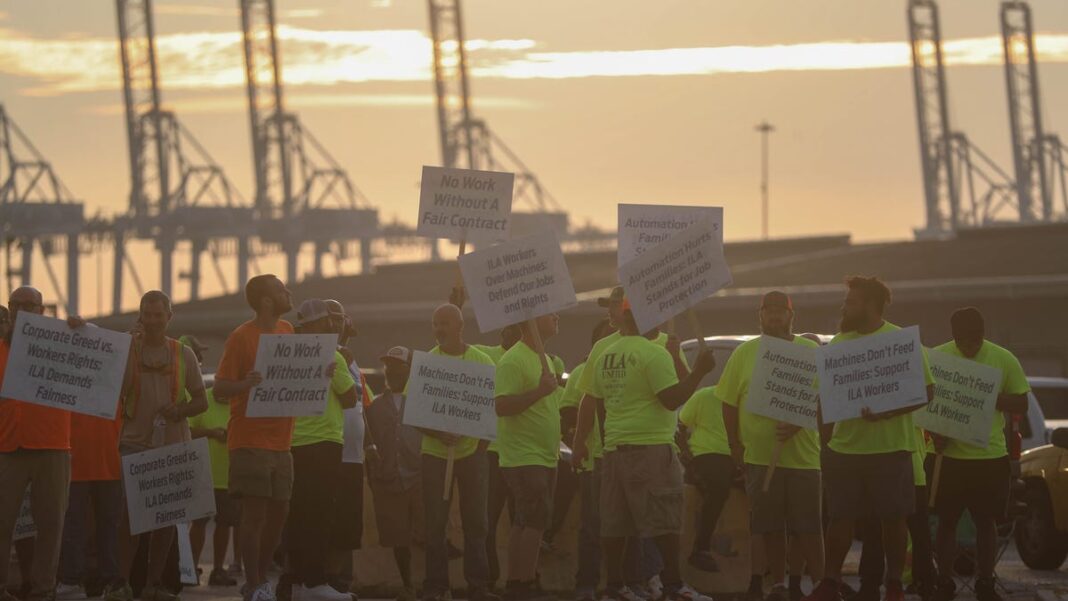East Coast Port Strike May Influence Fed’s Interest Rate Decisions
NASHVILLE, Tennessee — The COVID-19 pandemic severely disrupted global supply chains, leaving a lasting impact on U.S. Federal Reserve officials who initially believed that port lockdowns and delays with container shipments would only lead to temporary inflation.
A strike initiated by dockworkers on the U.S. East Coast and Gulf Coast starting Tuesday is not expected to create extensive complications, yet it could still cloud the Federal Reserve’s understanding of the current economic situation as they prepare for their upcoming interest rate decision on November 6-7.
“If it’s brief, we will manage it,” said David Altig, executive vice president and chief economic adviser at the Atlanta Fed, during a National Association for Business Economics gathering in Nashville on Sunday.
However, he pointed out that a contributing factor keeping inflation down recently has been the decreasing prices for goods, which might be jeopardized if the imports are significantly hindered for an extended period during the dockworkers’ strike.
“A change in the pricing dynamics of durable goods would be a troubling scenario for central bankers who depend on stable goods prices to maintain overall inflation control,” Altig mentioned.
Ports stretching from Maine to Texas have shut down following the International Longshoremen’s Association announcing its first strike since 1977, leading to thousands of workers taking to the picket lines and leaving ships and containers stranded at key global trade facilities. Many analysts anticipate that the labor dispute will not last long, considering the potential ramifications on commerce that would pressure both parties to reach a resolution, or might even prompt intervention from the White House.
It might take some time for the complications highlighted by Altig to become significant enough to derail the Fed’s efforts to achieve its inflation target of 2%, a goal they feel is nearly within reach. Many retailers, preparing for the holiday season, have stocked up on inventory due to concerns about the strike, which might help meet consumer demand.
Impact Concerns
A strike lasting just two weeks could coincide with the period during which government officials gather data for the October U.S. jobs report, possibly skewing one of the last crucial indicators the Fed will analyze before their meeting in November. If port-related businesses have to lay off workers, the number of payroll jobs could decrease, and the unemployment rate might rise, even though the striking workers aren’t officially counted as unemployed.
“This complicates matters for the Fed. There isn’t a straightforward policy outcome. The situation could potentially harm demand while simultaneously applying inflationary pressures,” noted Julia Coronado, president of MacroPolicy Perspectives, at the NABE conference.
Whether this situation affects the Fed’s decisions in the November meeting depends on how long it lasts, especially with a rate cut likely anticipated shortly after the U.S. presidential election.
However, Erin McLaughlin, a senior economist at the Conference Board, cautioned that “if this persists into the first week of November… we may see some constraints.” She noted that consumers have gained a heightened awareness of supply chain issues since the pandemic and may become more cautious with their spending in the event of a prolonged strike.
“Would it influence policy if resolved in a typical timeframe? I highly doubt it,” former Cleveland Fed President Loretta Mester remarked in an interview at the NABE conference. “Nevertheless, it’s something to consider. A prolonged strike would indeed affect prices and could have repercussions for the job market if goods become unavailable or economic activity halts.”

